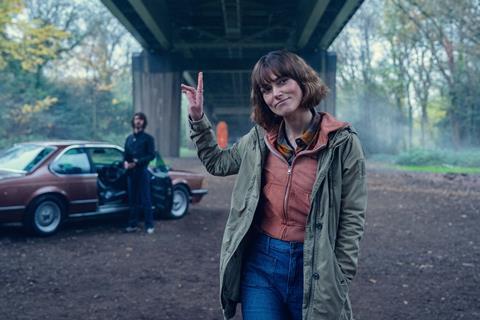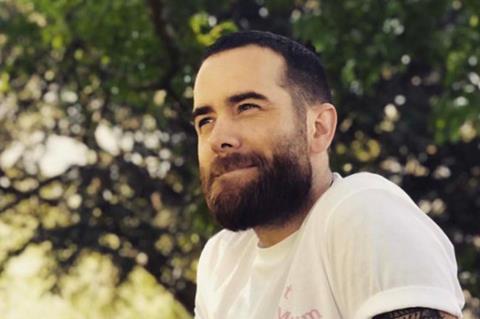Black Doves showrunner/writer Joe Barton on how the creation of his spy thriller was down to a series of fortuitous events.

Inspiration is often described as happening in a flash. That was certainly the case for Joe Barton with his six-part Christmas-in-London espionage thriller Black Doves, which started streaming on Netflix in December 2024. But what was most surprising for the Brighton-based writer was just how quickly that flash caught fire. “It happened so fast,” he says. “Quicker than I’ve ever experienced.”
Barton remembers staying in a London hotel in 2022, having come to the capital for a Christmas party. He stood out on the balcony of his room one evening, taking in the bustle of the streets and the twinkling Christmas lights. But it was not the illuminated decorations that fired his imagination so much as the dark shadows they cast. “What if you were a spy or an assassin or someone like that within this cheerful, jolly world?” he wondered.
Then the synapses started triggering, connecting other ideas he felt were ripe for dramatic treatment: the British ‘spy cops’ scandal of a few years earlier, when undercover policing went too far; a letter he had read in The Guardian newspaper from a woman who had lost her secret lover; and his longheld desire to base a story on the “powerful and potent” friendship between a straight woman and a gay man. Having recently seen ITV’s A Spy Among Friends, Barton resolved to blend these ideas into his own espionage yarn, about a politician’s wife whose clandestine life as a private-sector snoop is jeopardised by the murder of her lover, with her gay ‘triggerman’ colleague becoming embroiled in the bloody, escalating chaos.
Barton wrote the first episode on spec between Boxing Day 2022 and New Year’s Day 2023. Within a week, Keira Knightley was on board in the lead role of Helen Webb, having been connected with Barton via the manager they share; serendipitously, she had been looking to work on a TV drama based in modern London, and was a fan of Barton’s 2019 BBC-Netflix crime series Giri/Haji.
Then Barton sent the script to his longtime collaborator Jane Featherstone of Sister Pictures, with whom he had made Giri/Haji. It just so happened she was in Budapest with Netflix VP of content Anne Mensah (where they were working together on Netflix series Eric), who revealed to Featherstone she was seeking “a contemporary espionage British-set spy show with A-list female talent”, as Barton puts it.
Black Doves was greenlit in short order, with Knightley’s presence helping to attract a prestige cast including Ben Whishaw (as the aforementioned triggerman), Sarah Lancashire and Kathryn Hunter. The writer describes it all as “a series of fortuitous coincidences or events”. His new show “went from not existing at all to the cameras rolling within about eight months”. And then, just a few months later, it debuted to glowing reviews and earned Knightley a Golden Globe nomination, having already been picked up for a second season by a keen Netflix.
Slow burn

Yet this bright flash of success has come after something of a slow burn for Barton. Following a first-ever gig as a driver on the set of true-life crime drama Cass in 2008, his breakthrough came with an invitation to join the writers’ room of 2011 E4 comedy Beaver Falls.
Since then, his career has taken in the likes of Our World War and Humans, as well as the screenplays for movies iBoy and The Ritual. It then shifted up to showrunning with the beautifully idiosyncratic Giri/Haji, followed by supernatural YA adaptation The Bastard Son & The Devil Himself at Netflix and Sky Max’s sci-fi mind-twister The Lazarus Project.
Perhaps unsurprisingly, given the influence of US cinema on his work (particularly the 1990s indie boom fronted by Quentin Tarantino), Barton has also felt the lure of Hollywood. But, sadly, neither his once-announced Cloverfield sequel nor his HBO Max Batman spinoff series Gotham PD ultimately worked out.
“It was a learning process,” he says philosophically. “I would still definitely like to work in that world — send me a Jurassic Park or something, I’ll jump on board no problem. But I also love the British system, and I’m very happy doing my Black Doves and Lazarus Projects and all that.”
Clearly, Barton is highly valued on the British TV scene, as is suggested by the recent deal struck between Sister and his newly minted Noisy Bear. “It’s essentially just a little satellite company,” he explains. “I don’t really employ anyone, it’s just myself, but I use the Sister Pictures scaffolding.”
He cherishes the collaboration. “I like the shows they make. I like the way they do business. I like the way they treat people. They bring out the best in me, so I wanted to carry on working with them.
“I also wanted to do something that gave me a little bit more creative control,” he adds. “As you go along in your career, what you’re always trying to do is give yourself a slightly bigger voice in the room.”
Netflix clearly values Barton, though he is taking nothing for granted having seen both Giri/Haji and The Bastard Son & The Devil Himself axed after only one season. “It’s not been a complete bed of roses,” he admits. “I would have liked the shows I’ve made with them before to come back. But the big thing that’s always been the case with Netflix is that you’re working with people who are really smart and quite brave and willing to take risks, which they don’t get enough credit for. Netflix really trusts its audience, which can be rare.”
Barton likes to take some big swings himself. His shows have earned acclaim by combining nuanced, relateable character work with a playful approach to genre and form that somehow makes his narratives simultaneously grounded and heightened, while avoiding convention and predictability.
“I love genre and I grew up watching genre films,” he says. “I love characters, too. I love writing about people. But I don’t love plot so much. Sometimes I just get to a point where I’m like, ‘I’m just going to have five pages of people chatting in a bar somewhere about how they’re all heartbroken, and then I don’t have to do the really difficult plot stuff for a bit.’” He laughs. “Maybe my whole career has been an exercise in putting off plotting on a whiteboard.”
High notes
Barton’s future, in contrast, seems quite plotted out now. His limited-series adaptation of Peter Shaffer’s Amadeus is due out on Sky later this year, reuniting him with Giri/Haji lead director Julian Farino and star Will Sharpe (who plays Mozart, opposite Paul Bettany as Salieri).
“It was just so different from anything I’d done,” Barton explains of this long-gestating project. “I had this desire to do something that was a bit more dramatic, that didn’t have a genre crutch.” While he recognises that remaking such a beloved property might raise eyebrows, he believes the series more than justifies its existence. “It’s a story that’s got such credence and power, so that was fun to play around with.”
Barton is currently working on a couple of projects with Sister and a film — none of which he can reveal — and he has season two of Black Doves, on which he will work with his regular collaborator Farino. “It’s nice because it does thematically feel in the same sort of world as Giri/Haji,” he says. “So it’s good to be doing that with him as well.”
After conceiving, writing and shooting the first season at Christmas, with filming almost entirely on location and during long, cold nights, has Barton made the second season a little bit sunnier and warmer? “That was our original plan,” he confirms. “But because of the way the schedule’s turned out, we’ve found out we’re essentially filming at the same time of year. We were originally writing lots of summer parties, and now I think it’s going to be quite autumnal.”
But he is definitely avoiding Christmas this time, as much as he loves that time of year. “It’s fine when you’re filming,” he says, “but in the edit, when it’s July and you’re listening to ‘Little Drummer Boy’ for the 300th time, you feel like you never want to look at an elf again.”















![[L-R]: Amanda Villavieja, Laia Casanovas, Yasmina Praderas](https://d1nslcd7m2225b.cloudfront.net/Pictures/274x183/6/4/1/1471641_pxl_20251224_103354743_618426_crop.jpg)









No comments yet